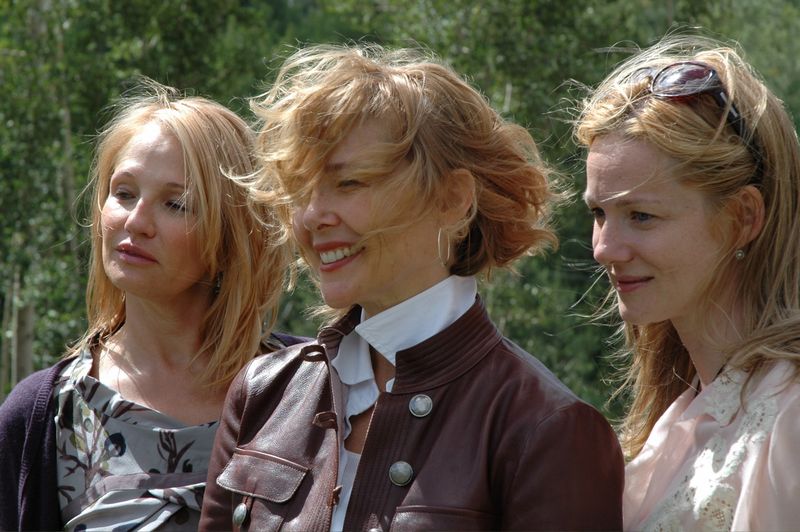TELLURIDE, Colo. — After years of controversy, one of the most persistent questions in the world of film has finally been settled: Yes, Annette Bening‘s face was used as the model for the torch-bearing woman on the logo that opens every Columbia Picture.
I know this because Annette Bening told me so herself. We were clutching our water bottles at the opening day brunch of the Telluride Film Festival, and despite the uncounted intelligent questions I might devised, I just plain asked her if she was the Columbia Woman, “because she looks just like you.”
“Oh, sure,” she said, with a smile you will never see on the very serious Columbia Woman. “The artists told me it was me. But just the face. Not the body.”
The body is covered in such flowing robes that the question is academic, and soon Bening was saying that she hardly ever attends film festivals, but that this one seemed kind of special. It is wonderful, I agreed, especially after you grow accustomed to the 10,000-foot altitude and can stop panting.
Telluride may be the only film festival without an angle. Audiences come here to see films, not to buy, sell or hype them. Well, maybe a little hype. Far from trying to publicize its films, Telluride never even announces them in advance; you have to attend on faith.
The programming is ingenious in the connections it makes. This year, for example, Bening is here because she appears in Istvan Szabo’s “Being Julia,” rumored to be an Oscar contender. The movie is based on the novel Theater, by W. Somerset Maugham, and set in the London theater world of the 1930s. Bening’s character shocks her circle and betrays her husband (Jeremy Irons) by having an affair with a young American.
Starting with “Being Julia,” the festival programs sideways by adding a special screening of a restored print of Alfred Hitchcock’s “Secret Agent” (1940), based on a novel by Maugham, and also showing one of the four sequences in “Quartet” (1949), based on Maugham stories. Jeffrey Meyers, Maugham’s biographer, will speak before and after the screenings. And then another sideways move, to “Blackmail” (1929), Hitchcock’s last silent film, not connected to Maugham, but connected to the Alloy Orchestra of Cambridge, Mass., which every year performs a score for a silent film here.
So you see how the audience wanders from one venue to another, led by Telluride’s belief that a festival should celebrate all kinds of films, not just those opening in the multiplex a week from Friday.
The Telluride Medal will be presented to three honorees this year: Theo Angelopoulos, the Greek director; Laura Linney, the American actress (and star of two festival selections, “P.S.” and “Kinsey“), and Jean-Claude Carriere, greatest of modern French screenwriters (and then you can slip out of the Sheridan Opera House and go down the street to the Mason’s Hall and admire Carriere’s screenplay for Bunuel’s “Belle de Jour,” and remember that its star, Catherine Deneuve, was awarded the Telluride Medal a few years ago).
Telluride follows the careers of those it has discovered, including the director Lodge Kerrigan, whose “Clean, Shaven” and “Claire Dolan” played here. Both brilliant, both hard to take. Now he’s back with “Keane,” starring Damian Lewis as a deranged homeless man. And the festival salutes the careers of those it loves; Rip Torn will be here for a revival of his great performance in “Payday” (1973), directed by Daryl Duke and inspired by the last days of Hank Williams Sr. “Payday” will be introduced by Buck Henry, this year’s guest programmer, who has also brought along “Hunger,” the 1966 Henning Carlson film about an artist starving to death, and “Million $ Legs” (1932), starring W.C. Fields. Talk about eclectic.
I eagerly anticipate “Yes,” directed by Sally Potter (“The Tango Lesson“) and starring Joan Allen as a scientist having an affair with a Lebanese migrant worker. And “Palindromes,” the new Todd Solondz film, starring Ellen Barkin in a story about a young runaway. And “Unforgivable Blackness,” Ken Burns’ new documentary about heavyweight champ Jack Johnson. Johnny Depp is rumored to be coming for a sneak preview of his new film “Finding Neverland,” but it’s not on the schedule; the festival says it knows nothing about it, which is always a good sign.
American audiences will get their first looks at several Cannes 2004 hits: “Moolaade,” by Ousmene Sembene of Senegal, a drama about the ritual genital mutilation of young women; “Bad Education,” by Spain’s Pedro Almodovar, about a man deceived by the story of an old school friend (well, that’s sort of what it’s about), and “House of Flying Daggers,” by Zhang Yimou, whose “Hero” is the current box-office champ. Zhang Ziyi, the great beauty who stars in both films and in “Crouching Tiger, Hidden Dragon,” will be here in person.
We have been invited to dinner every night, and have declined. To sit down in a restaurant is to miss a movie, maybe two movies, and the interlocking Telluride schedule operates according to the domino principle; miss one, and your whole lovingly devised festival plan goes to pieces. We have stocked up on sliced turkey, peanut butter and corn flakes; know where the best bran muffins are to be had, and will even turn to popcorn before losing two hours in a restaurant. We have three days to see 15 films. More, if we’re lucky. Of course, some of these films will also play at the Toronto Film Festival, which starts Thursday and differs from Telluride in several ways, including the availability of oxygen.












